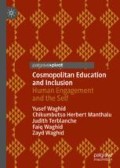Abstract
In this chapter, using Sharon Todd’s notions of judgement and “cosmopolitics,” which is a contestation of cosmopolitan universalism, we contend that learners are not a homogeneous group with generally common fundamental interests. What constitutes their moral needs as moral persons seeking just encounters and relations can be met by a cosmopolitanism that emphasises and embeds common values only in the objective roles and rules that govern educational encounters. The chapter argues that learners are concrete beings with constitutively different moral needs and interests, which cannot all be couched up in impartialist terms in order to expect that adherence to impartial rules and roles will guarantee satisfaction of cosmopolitan ideals. Given this background, it is imperative that judgement-making in the university by teachers and others should not be restricted to Todd’s idea of scripted cosmopolitanism, but rather intersubjectivity must contextualise rules and roles to avoid the risk of ignoring and undermining legitimate moral interests that reside in a learner’s otherness as a concrete being.
Access this chapter
Tax calculation will be finalised at checkout
Purchases are for personal use only
References
Arneson, R. J. (2016). Extreme cosmopolitanisms defended. Critical Review of International Social and Political Philosophy, 19(5), 555–573.
Benhabib, S. (2011). Dignity in adversity: Human rights in turbulent times. Cambridge: Polity.
Brighouse, H. (2003). Should we teach patriotic history? In K. Mcdonough & W. Feinberg (Eds.), Citizenship and education in liberal-democratic societies: Teaching for cosmopolitan values and collective identities (pp. 157–174). New York, NY: Oxford University Press.
Chirwa, G., & Naidoo, D. (2014). Curriculum change and development in Malawi: A historical overview. Mediterranean Journal of Social Sciences, 5(16), 336–345.
Code, L. (2012). Taking subjectivity into account. In C. W. Ruitenberg & D. C. Phillips (Eds.), Education, culture and epistemological diversity: Mapping a disputed terrain (pp. 85–100). Dordrecht: Springer.
Gay, G. (2000). Culturally responsive teaching: Theory, research, and practice. New York, NY: Teachers College Press.
Giroux, H. A. (2004). Critical pedagogy and the postmodern/modern divide: Towards a pedagogy of democratization. Teacher Education Quarterly, 31(1), 31–47.
Habermas, J. (2001). The postnational constellation and the future of democracy. In M. Pensky (Ed.), The postnational constellation: Political essays (pp. 58–112). Cambridge, MA: The MIT Press.
Habermas, J. (2003). Toward a cosmopolitan Europe. Journal of Democracy, 14(4), 86–100.
Ladson-Billings, G. (2014). Culturally relevant pedagogy 2.0: A.k.a the remix. Harvard Educational Review, 84(1), 74–84.
Malawi Government. (2013). Education Act. Malawi.
Masina, L. (2014, August 21). Malawi schools to teach in English. Aljazeera. Retrieved January 1, 2018, from http://www.aljazeera.com/news/africa/2014/08/malawi-schools-teach-english-local-debate-colonial-201482184041156272.html.
Nili, S. (2015). Who’s afraid of a world state? A global sovereign and the statist-cosmopolitan debate. Critical Review of International Social and Political Philosophy, 18(3), 241–263.
Nussbaum, M. (2002). Patriotism and cosmopolitanism. In M. C. Nussbaum & J. Cohen (Eds.), For love of country? (pp. 2–20). Boston, MA: Beacon Press.
Todd, S. (2007). Teachers judging without scripts, or thinking cosmopolitan. Ethics and Education, 2(1), 25–38.
Todd, S. (2010). Living in a dissonant world: Toward an agonistic cosmopolitics for education. Studies in Philosophy of Education, 29, 213–228.
Uchehara, K. (2016). Sub-Saharan African countries and migration to Europe: Exploring the motivations, effects and solutions. Informatol, 49(1/2), 79–85.
Author information
Authors and Affiliations
Corresponding author
Rights and permissions
Copyright information
© 2020 The Author(s)
About this chapter
Cite this chapter
Waghid, Y., Manthalu, C.H., Terblanche, J., Waghid, F., Waghid, Z. (2020). Universalism and Judgements in Educational Encounters. In: Cosmopolitan Education and Inclusion. Palgrave Pivot, Cham. https://doi.org/10.1007/978-3-030-38427-2_6
Download citation
DOI: https://doi.org/10.1007/978-3-030-38427-2_6
Published:
Publisher Name: Palgrave Pivot, Cham
Print ISBN: 978-3-030-38426-5
Online ISBN: 978-3-030-38427-2
eBook Packages: EducationEducation (R0)

